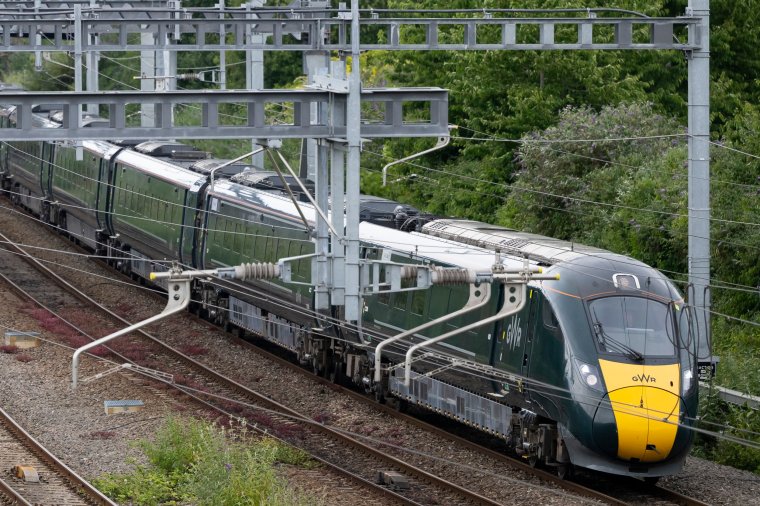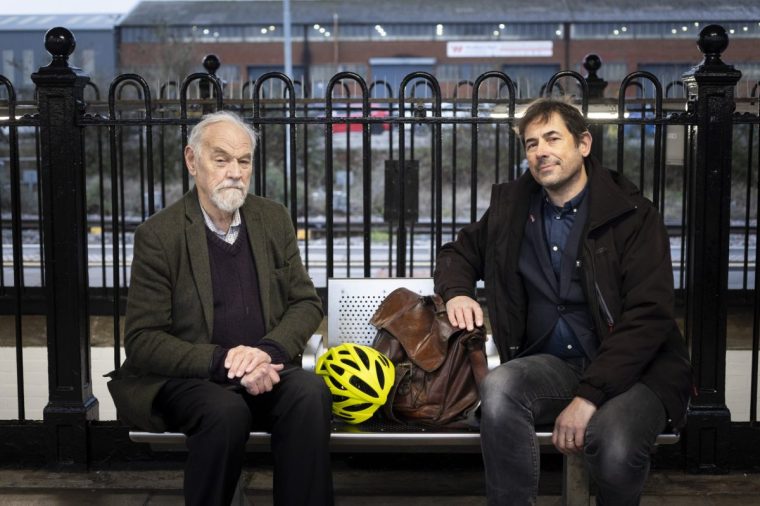Moaning about Britain’s railways has become a national pastime. But rather than joining the chorus, frustrated rail users in the West Country are taking matters into their own hands – by launching their own train company.
“You find yourself standing on windswept platforms thinking ‘I could do better than this’,” says Alex Lawrie. He’s the chair of the community owned Go-op, which last month was given the green light to compete with the giant multi-national owned Great Western Railway (GWR) in Somerset and Wiltshire.
It’s a story that might remind some of The Titfield Thunderbolt – the famous Ealing Comedy film about a group of villagers running their own railway line.
But Go-op is a much more serious business. Next week will see another important milestone for the co-operative rail venture – currently owned by 280 members – as it seeks to attract the capital it will need to realise its plan to get its own trains on the tracks next year.
15 years of frustration with trains that don’t stop
Fifteen years in the making, the company was borne out of the frustration and abandonment felt by many commuters and other rail passengers in the West Country. For while GWR’s sleek green trains are a regular sight in the region, as they rattle between London and Cornwall, few of the streamlined services stop at local towns and villages.

Those that do are infrequent and often oversubscribed, say some rail users. “They don’t go at the times people want them to,” says John Hassell, an 82-year-old from Bishops Lydeard, near Taunton, who’s on Go-op’s board. “You get overcrowding.”
Natasha Dawson, a rail user from Chippenham who used to work for GWR as a conductor but is now training to be a Go-op train driver, agrees. “Sometimes you might be stood up for a two-hour journey,” she says.
GWR – owned by First Group which has £649.6m a year revenue – points out that it is not responsible for service levels. “We are contracted by the Government to deliver strict service level agreements,” said a spokesperson for the company which, they said, welcomed Go-op’s arrival.
GWR v Go-op – rail’s David and Goliath battle
Ownership
GWR is owned by FirstGroup, a multinational transport company that runs bus and rail services in the UK and Ireland and has had stakes in operations as far afield as North America and Hong Kong. It is based in Aberdeen, Scotland, and listed on the London Stock Exchange.
Go-op is owned by members of the rail co-operative (many of them local train users) – 280 and counting.
Profits
FirstGroup had underlying profits of £82.1m in 2023 and pays out dividends to shareholders.
Go-op has yet to run a train. But it says all profits will be reinvested to improve its services.
Executive pay
FirstGroup’s CEO Graham Sutherland is set to receive an £800,000 bonus on top of his £567,000 salary in 2024.
Go-op will have a “relatively flat management structure” but will soon be recruiting for an operations director, salary: £80k. Bonuses will be shared between all employees. “Everyone gets to benefit if we hit our targets,” says Lawrie.
Lawrie also agrees that the fault is not necessarily GWR’s but says the end result for passengers is nonetheless unsatisfactory. “GWR waits to see what the government tells it to operate and operates it,” he says. “You rely, then, on the Government specifying the right routes and, with the best will in the world, I don’t think that’s something you should count on.”
Challenge to ‘London-centric’ approach to UK rail
Lawrie, who lives in Stoke St Gregory, near Taunton, says there’s long been a London centric approach to the UK’s railways. Villages like his are often forgotten.
“A lot of the planning has been done following the Victorian model of lines radiating out from the capital,” he says. “The idea that people might actually want to travel between one provincial town or city and another has been somewhat lost.”

This, warns Hassell, exacerbates social isolation. “We’ve got a large aging population here,” he says. “These people have all got relatives somewhere and want to go and see them, and vice versa.”
Hassell has been riding the rails since the “good old days of steam”. As a boy, he recalls asking a train driver at London Liverpool Street if he could look around an idling locomotive. “The driver said: ‘I’ve got to go to Stratford now, would you like to come?’ So, I did.” Hassell was seven.
Simpler times. These days Britain’s railways are maddingly bureaucratic. There are estimated to be around 55m different rail fares in the UK. “Decades of muddled decision-making have left the railways fragmented,” said former transport secretary, Louise Haigh, in a statement to Parliament last month, in which Labour pledged to reform the rails.
Community rail company Go-op pledges simplicity
Go-op promises to keep things simple when it launches “at the end of 2025”. It will start with just two routes: one along a currently unserved line between Taunton to Swindon (via Chippenham, Melksham, Trowbridge, Westbury, Frome, Bruton, and Castle Cary); and the other between Taunton and Weston-Super-Mare, which will see it compete directly with GWR.

However, Go-op says that its routes will, perhaps counterintuitively, boost profits for GWR, because they will improve connectivity, stimulating demand for train travel.
“GWR will benefit from our presence to the tune of around £1m per year,” says Lawrie, citing forecasting figures from the Railway Consultancy.
Having its application to operate trains approved by the Office of Rail and Road last month was a milestone for Go-op, but formidable obstacles lie further up the track. It needs to raise £2.85m to buy rolling stock, train staff and pay their wages. On Wednesday [18 December], it will launch a share offer on Crowdfunder to meet that target, giving anyone the opportunity to invest in the UK’s first community run railway.
Go-op raised £350,000 through a similar share offer to get it this far, though nobody currently takes a salary. “Now we need to build our membership from the hundreds to the thousands,” says Lawrie, who’s on secondment from South West Co-operative Development, which helps co-operatives scale up. “There’s a lot of work ahead.”
The difficulty of finding trains to run new service
Securing actual trains to run is another challenge. “Whenever we’ve had a set setback, it’s often been because the rolling stock we thought would be available turns out not to be – we get the crumbs from the table,” says Lawrie. “We’ve narrowed it down to two types.”
Did they ever consider quitting? “Every two or three years, there would be a moment where we said, ‘this is hopeless’,” admits Lawrie. “But, for all the setbacks, we always found that we had inched the project forwards, so we stuck with it.”
Go-op intends to plough all profits back into improving its service, and its schedule will be informed by the needs of rail users – a concept that shouldn’t seem radical but is. Fares will be in line with GWR’s, but shareholders will be entitled to discounts.
For Dawson, who enjoyed working for GWR but found it fast-paced and competitive, Go-op offers promising opportunities. “I always knew I wanted to be a train driver, but GWR is a big company, and you’re fighting tooth and nail for that top spot to be a driver,” she says. “Go-op feels almost like a family.”
It’s this “family” spirit that Lawrie hopes will make Go-op attractive to workers, helping it overcome staff shortages that routinely force other operators to cancel services. “The trust you can build inside a co-op will enable us to be a bit more resilient than another business,” he says. “People want to show up.”
Go-op’s launch will be “a big step for the co-op movement”, says Lawrie.
“In this country, we’ve tended to regard co-ops as having a certain place; it’s okay for them to sell groceries and run pubs, but you don’t expect to see them doing anything else,” he says. “But actually, as a business model, it’s applicable to almost every sector.
“If we can enter the rail industry, with the very high barrier to entry that it has, then I think we can safely say co-ops belong everywhere.”
